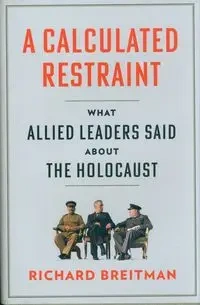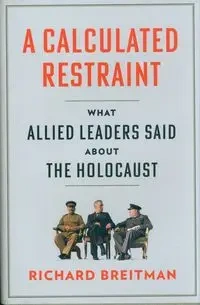A Calculated Restraint - Richard Breitman
Promocja
A Calculated Restraint - Richard Breitman
- What Allied Leaders Said about the Holocaust
AutorzyRichard Breitman
EAN: 9780674293649
Symbol
57779B04421KS
Rok wydania
2025
Strony
340
Oprawa
Twarda z obwolutą
Format
14.0x22.0cm
Waga
530 g

Bez ryzyka
14 dni na łatwy zwrot

Szeroki asortyment
ponad milion pozycji

Niskie ceny i rabaty
nawet do 50% każdego dnia
Niepotwierdzona zakupem
Ocena: /5
Symbol
57779B04421KS
Kod producenta
9780674293649
Rok wydania
2025
Strony
340
Oprawa
Twarda z obwolutą
Format
14.0x22.0cm
Autorzy
Richard Breitman
Waga
530 g

An eminent historian of the Holocaust examines why Churchill, Roosevelt, and Stalin, though faced with mounting evidence of the Nazi extermination of Jews, were reluctant to speak out against the atrocities.
The Allied leaders rarely spoke directly about the Holocaust in public. When Churchill and Stalin alluded to Nazi mass murder of civilians in early speeches, they said much less than they knew. Not until December 1942 did Allied governments issue a joint statement about Nazi Germany’s policy of exterminating the Jews of Europe. Roosevelt deferred his own public statement until March 1944. Why didn’t these leaders speak up sooner?
Through close readings of public and private statements, Richard Breitman pieces together the competing motivations that drove each leader’s response to the atrocities. All three knew that their reactions would be politically sensitive, as Nazi propagandists frequently alleged that the Allies were fighting on behalf of Jews, and that Jews were the puppet masters behind their governments. At a time of globally prevalent antisemitism, these calumnies had force. After the German invasion of the USSR, moreover, Stalin clearly wanted to focus on the threat to the Soviet state and people. At the same time, Churchill and Roosevelt realized that complete silence would prompt accusations of willful blindness. They usually finessed this dilemma by denouncing Nazi atrocities in general, prioritizing wartime constraints over moral considerations.
Timely and incisive, A Calculated Restraint sheds new light on the relationship between World War II and the Holocaust. Ultimately, the Allied leaders’ responses cannot be reduced to a matter of character. What they said—and chose not to say—about the Holocaust must be understood in light of the political and military exigencies that drove their decision-making.
EAN: 9780674293649
EAN: 9780674293649
Niepotwierdzona zakupem
Ocena: /5
Zapytaj o produkt
Niepotwierdzona zakupem
Ocena: /5
Napisz swoją opinię

